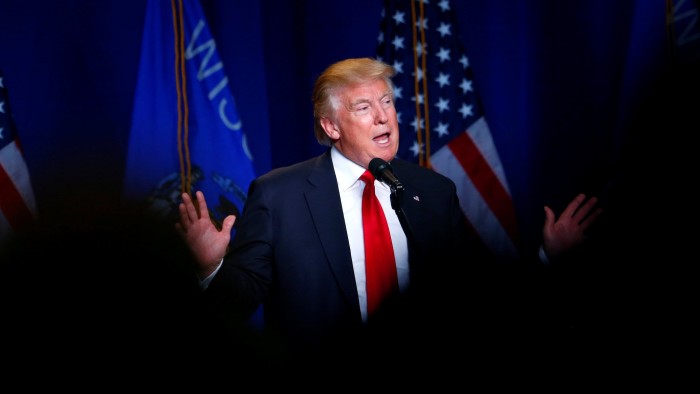Trump’s thin skin shows CEOs are not made for politics

Roula Khalaf, Editor of the FT, selects her favourite stories in this weekly newsletter.
We need political leaders with real world experience. Too many of those who govern us have never worked outside politics. It is a frequent cry. But if we think business leaders are the answer, Donald Trump, the Republican presidential candidate, is providing a near-daily display of how hard it is to leap from running a business to winning elections.
There are two reasons. First, business leaders such as Meg Whitman and Carly Fiorina, who have both lost elections, did not seem to grasp that holders of political office have less control over events than does a chief executive. While a business boss can hire, fire, acquire and sell, even the US president is hemmed in by the constitution and can be stymied by Congress, as the political economist Francis Fukuyama has noted.
British prime ministers have more executive and legislative power but still have to accommodate rivals who might challenge for their job. The aggravation Tony Blair tolerated from his chancellor Gordon Brown? No chief executive would put up with it for a week, let alone 10 years.
The second and more important reason business leaders struggle in the political fray is that they are unprepared for the criticism, invective and ridicule they will have to endure.
The press does sometimes attack chief executives. Politicians occasionally attack them too. Hauled before legislative committees, they react badly to the kind of questioning a political office-holder expects as a matter of course.
Some respond truculently, as did British retailer Sir Philip Green when asked by a House of Commons committee in June to explain the shortfall in the pension fund of BHS, the chain he ran that has since gone bust. Or they blink into the bright lights of a televised hearing and stumble through their answers — which were the reactions of Starbucks, Amazon and Google executives when questioned about tax arrangements by a UK parliamentary committee in 2012, and US car industry chiefs when congressional inquisitors demanded to know why they had flown to Washington in their private jets in 2008.
Few business bosses know what it feels like to face the vituperation endured by politicians or to be caricatured relentlessly. Steve Bell, the Guardian cartoonist, decided that David Cameron’s shiny pink complexion made it look as if he had a condom over his head — and he drew the former prime minister that way for years. Zapiro, the South African cartoonist, always draws President Jacob Zuma with a shower growing out of his head — never allowing him to forget that while on trial in 2006 for allegedly raping a woman who was HIV-positive (he was acquitted), he said he had avoided infection by taking a shower.
Politicians may loathe these depictions but they have to put up with them. Mr Bell says Mr Cameron once said to him “you can only push a condom so far” — which he wrote on the back of the moving truck in the cartoon he drew last month of the Camerons leaving 10 Downing Street.
Chief executives, by contrast, are surrounded by managers and staff eager to win favour. Talking back to the boss does not get people far. Business leaders become used to the admiration but this can make them thin-skinned when outsiders criticise them. A retired business leader once called to yell at me for writing that he couldn’t take criticism.
Politicians’ press officers try to bully critics too but those who successfully run for public office know they often have to let the brickbats sail by.
Any political leader could have told Mr Trump not to attack Megyn Kelly, a Fox News female television presenter, by saying she had “blood coming out of her eyes, blood coming out of her wherever”. A sensible politician would have responded to criticism from the parents of a dead US Muslim soldier by saying how much he respected their sacrifice, rather than suggesting, as Mr Trump did, that the soldier’s mother had been prevented from speaking at the Democratic convention.
Few chief executives are as abusive towards their detractors as Mr Trump. Even fewer speak as recklessly or pick as many fights. Many will, rightly, object to being likened to him. But he is just an extreme example of the narcissistic boss who, once in the public arena, is incredulous that people dare to criticise him.
michael.skapinker@ft.com
Twitter: @Skapinker
Comments